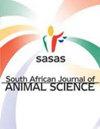Effect of transportation distance on the physiological condition and carcass traits of kampong chickens
IF 0.6
4区 农林科学
Q3 AGRICULTURE, DAIRY & ANIMAL SCIENCE
引用次数: 0
Abstract
This research aimed to investigate the effect of transportation distance on the physiological conditions and carcass traits of kampong chickens. Two hundred and twenty-five male kampong chickens were transported for distances of 30 km, 60 km, and 90 km, departing from three villages. Their physiological conditions were observed for up to 12 hours after having reached the final destination, and they were slaughtered after 45 minutes of lairage. The results showed that the transportation distance had a minor influence on the male kampong chickens' physiological conditions on arrival and on resulting carcass traits. Decreased oxygen consumption and metabolism rates were observable only eight hours after the rest period, without further effects on body temperature, tonic immobility, and blood triglyceride levels. There were no significant changes in live shrink, liveability, and carcass production from various transportation distances. However, a significant percentage increase in live shrink, accompanied by a significant decrease in visceral weight, was noted after transportation distances above 60 km. There was a significant decrease in the percentage of drumstick weight and a minor decrease in overall carcass quality, derived from bruising on the thighs. No significant changes were noted in graded carcass quality, meat water-holding capacity, pH, lactic acid, or water content. It was concluded that transportation distances up to 90 km were physiologically tolerable to kampong chickens, imposing minor negative impact on carcass traits.运输距离对甘榜鸡生理状况和胴体性状的影响
本研究旨在探讨运输距离对甘邦鸡生理状况和胴体性状的影响。225只雄性甘邦鸡从三个村庄出发,分别运输了30公里、60公里和90公里。在到达最终目的地后,对它们的生理状况进行长达12小时的观察,并在45分钟后将它们屠杀。结果表明,运输距离对雄磅鸡到达时的生理状况和胴体性状影响较小。仅在休息后8小时即可观察到耗氧量和代谢率的降低,对体温、补品不动和血液甘油三酯水平没有进一步影响。不同运输距离对活体收缩、宜居性和胴体产量的影响不显著。然而,在运输距离超过60公里后,活体收缩率显著增加,同时内脏重量显著下降。由于大腿上的瘀伤,鸡腿重量百分比显著下降,整体胴体质量略有下降。分级胴体质量、肉保水能力、pH值、乳酸或含水量没有显著变化。由此得出结论,90公里的运输距离对磅鸡来说是生理上可以忍受的,对胴体性状的负面影响很小。
本文章由计算机程序翻译,如有差异,请以英文原文为准。
求助全文
约1分钟内获得全文
求助全文
来源期刊

South African Journal of Animal Science
农林科学-奶制品与动物科学
CiteScore
1.50
自引率
0.00%
发文量
39
审稿时长
>36 weeks
期刊介绍:
The South African Journal of Animal Science is an open access, peer-reviewed journal for
publication of original scientific articles and reviews in the field of animal science. The journal
publishes reports of research dealing with production of farmed animal species (cattle, sheep,
goats, pigs, horses, poultry and ostriches), as well as pertinent aspects of research on aquatic
and wildlife species. Disciplines covered nutrition, genetics, physiology, and production
systems. Systematic research on animal products, behaviour, and welfare are also invited.
Rigorous testing of well-specified hypotheses is expected.
 求助内容:
求助内容: 应助结果提醒方式:
应助结果提醒方式:


